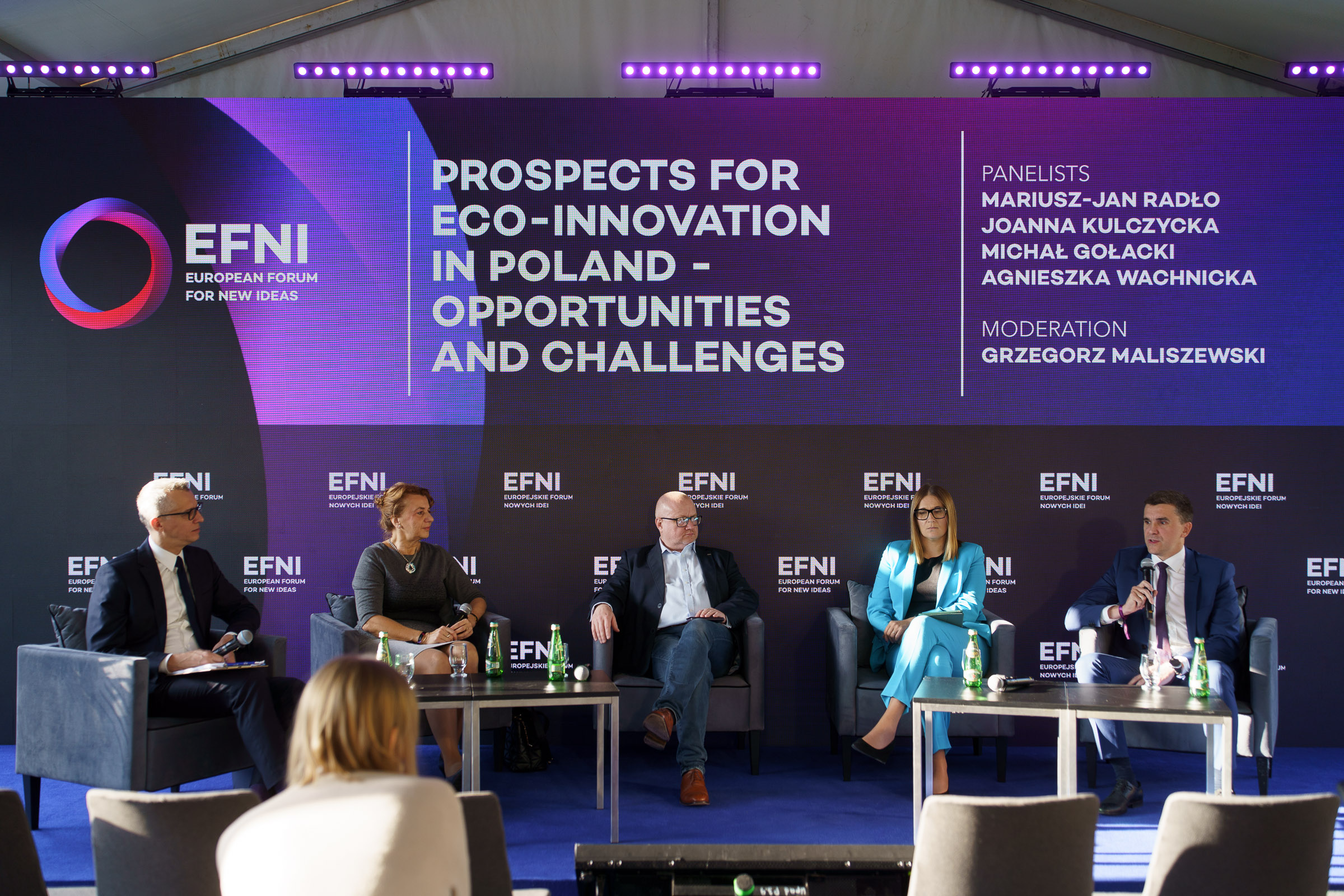24.10.2024
The Polish economy "cannot afford to take a step back"

Without increasing public awareness, it will be difficult to popularise eco-innovations and introduce a sustainable economy - said Grzegorz Maliszewski, Chief Economist at Bank Millennium, during the panel "Prospects for eco-innovation in Poland - opportunities and challenges". Vice-President of the Polish Bank Association, Agnieszka Wachnicka, argued that it is necessary to encourage Polish companies to invest in eco-innovations, otherwise "we will lose competitiveness in Europe".
During the European Forum for New Ideas in Sopot, Grzegorz Maliszewski presented the latest edition of the Millennium Eco-index report - The potential of eco-innovation of regions, and then moderated a panel devoted to the prospects of eco-innovation.
— Eco-innovation is discussed a lot in the context of the energy transition and is perceived as a process that requires large financial outlays. However, in order to reduce the environmental footprint of our business, you do not need to spend a lot of money. Therefore, in addition to eco-innovation, we should also talk about eco-mindfulness, i.e. take into account the impact on the natural environment in our actions — emphasised the chief economist of Bank Millennium.
Maliszewski referred to the data from Statistics Poland, which shows that only about 8 percent of companies in Poland have introduced innovations that have had a positive impact on the environment. Therefore, the panellists wondered how to convince entrepreneurs to eco-innovations.
— Small and medium-sized enterprises cannot afford to spend huge budgets on long-term investments that will not generate a return in a short time — explained Mariusz-Jan Radło, PhD, Professor at the Warsaw School of Economics from the Department of Global Economic Interdependencies at the Warsaw School of Economics. He added that entrepreneurs should be persuaded with the language of benefits, i.e. showing advantages, but also talking about threats. At the same time, he stressed, it is crucial to present examples of SMEs that have successfully developed their companies thanks to eco-innovation, scaling their operations and entering new markets, including those related to the circular economy, which is a great opportunity for development in changing economic conditions.
Michał Gołacki from the Patent Office of the Republic of Poland presented the statistics of the Patent Office. They show that about 15 percent of new patents are the so-called green patents. He emphasised that the ownership of patents in this area is highly dispersed in Poland, because companies usually have one or two patents.
During the panel, he also spoke about the proposal of a new model of financing innovation, the so-called IP Backed Finance. — There are companies, e.g. startups or small and medium-sized enterprises, whose main asset is intellectual property. The idea is to create a system in which intellectual property rights will be used to secure financing, for example as a pledge — he explained.
Vice-President of the Polish Bank Association, Agnieszka Wachnicka, stressed that due to the "fledgling capital market", the role of banks in the area of financing eco-innovation is "crucial". Banks — she added — provide about 80 percent of financing. — As far as the banking sector is concerned, it plays a double role. On the one hand, it provides financing to entrepreneurs, and on the other hand, it is also an intermediary in the distribution of national and EU funds. Let's not forget that we already have such resources to support eco-innovation — she said. She explained that entrepreneurs can use, among others, subsidies, guarantee programmes, green leasing or preferential financial instruments.
Wachnicka said that the Polish economy "cannot afford to take a step backwards", which would be stagnation in terms of eco-innovation. — We must encourage our companies to move forward. Otherwise, we will lose competitiveness in Europe, and Europe is already losing it in relation to the world. There is no turning back here — she said.
Joanna Kulczycka, PhD, DSc, Professor of AGH UST from the Faculty of Management of the AGH University of Science and Technology in Krakow, spoke during the debate about human capital in the context of the implementation of eco-innovative solutions. — The offer of universities is getting wider and wider, there are more and more fields of study. Nevertheless, there is still a trend in which computer science and management are the dominant majors, while difficult and technical studies such as mining or materials engineering are not chosen by students so often — she said.
She admitted that universities are also facing a decreasing number of students. And she added: — On the other hand, the good, interesting side is the much greater internationalisation of teaching. We have more international students, foreign doctoral students.
The Millennium Eco-index - Eco-innovation Potential report is an original project of Bank Millennium, which is based on data from Statistics Poland, the Patent Office of the Republic of Poland and the National Centre for Emissions Management (KOBiZE). It is based on the analysis of 21 variables from 5 areas (sub-indexes): expenditure on eco-innovation, effects of eco-innovation, socio-economic activity in the area of eco-innovation, resource efficiency and circular economy. The last of the sub-indices appeared in the study for the first time. It is a proprietary project of Bank Millennium, prepared in cooperation with substantive partners: AGH, SGH and the Patent Office of the Republic of Poland.
More information about the Millennium Eco-index on the report's website and in the press release